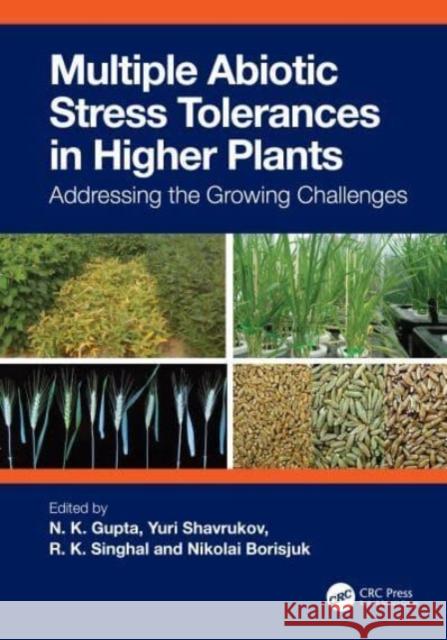Multiple Abiotic Stress Tolerances in Higher Plants: Addressing the Growing Challenges » książka
Multiple Abiotic Stress Tolerances in Higher Plants: Addressing the Growing Challenges
ISBN-13: 9781032292410 / Angielski
In the last 50 years, classical breeding has played a significant role in achieving higher crop productivity, but major crops have reached a plateau in their yield potential. Therefore, the current focus for sustainable intensification of agriculture is the use of biotechnological approaches to enhance the yield potential by combating the yield losses that occur due to abiotic stresses. The abiotic stresses are governed by multigenes, and therefore, a holistic approach is needed to get success in imparting stress tolerance to enhance the yield potential of our crops.Plants face multiple stress conditions during their life stages and adopt several physiological, biochemical, and molecular strategies to combat that, which are sometimes not sufficient to survive, particularly crop plants. The climate change era has created a need to understand the abiotic stresses in a holistic way. Therefore, a deep understanding of multiple abiotic stress mechanisms is necessary to develop crops tolerant to climate fluctuation.With this background, the outline of this book covers the following features:• Agriculture sustainability and molecular understanding of multiple stress tolerance• Systems biology for life-history strategies, conventional and genomic approaches above and underground• Genetic resources and molecular understanding of seed priming• Molecular signaling compounds, cell signal transduction and crosstalk between plant growth hormones and regulators• Roles Transcription factors, LEA proteins, reactive oxygen species and alternative oxidase• Genome editing, metabolomics and ‘Omics’ technologies
In the last 50 years, classical breeding has played a significant role in achieving higher crop productivity, but major crops have reached a plateau in their yield potential. Therefore, the current focus for sustainable intensification of agriculture is the use of biotechnological approaches to enhance the yield potential by combating the yield losses that occur due to abiotic stresses. The abiotic stresses are governed by multigenes, and therefore, a holistic approach is needed to get success in imparting stress tolerance to enhance the yield potential of our crops.
Plants face multiple stress conditions during their life stages and adopt several physiological, biochemical, and molecular strategies to combat that, which are sometimes not sufficient to survive, particularly crop plants. The climate change era has created a need to understand the abiotic stresses in a holistic way. Therefore, a deep understanding of multiple abiotic stress mechanisms is necessary to develop crops tolerant to climate fluctuation.
With this background, the outline of this book covers the following features:
• Agriculture sustainability and molecular understanding of multiple stress tolerance
• Systems biology for life-history strategies, conventional and genomic approaches above and underground
• Genetic resources and molecular understanding of seed priming
• Molecular signaling compounds, cell signal transduction and crosstalk between plant growth hormones and regulators
• Roles Transcription factors, LEA proteins, reactive oxygen species and alternative oxidase
• Genome editing, metabolomics and ‘Omics’ technologies











